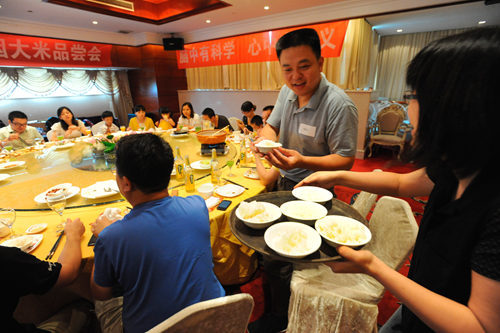|
 |
|
GIVE IT A WHIRL: Patrons at a restaurant sample genetically modified rice in Hangzhou, capital of east China's Zhejiang Province, on July 14 (CFP) |
Every year, Wang Xiuqiong defies a particular norm in the name of tradition: She makes her own moon cakes. As summer comes to a close, supermarkets and other shops around China quickly fill up with the Chinese pastry around the Mid-Autumn Festival, which fell on September 19 this year. The holiday food is a popular gift for friends, family and colleagues.
But keeping with tradition can prove difficult, as Wang, a native of Beijing, soon found out. Soybean oil is Wang's secret ingredient in her moon cakes, but this year she learned that most soybean oil sold in supermarkets is genetically modified (GM). For Wang, that's a big no-no. The supermarket near her home used to have a shelf dedicated to non-GM soybean oil, but the shelf was removed several months ago. A clerk at the supermarket told Wang it's almost impossible to find non-GM soybean oil suppliers. Wang ended up using sunflower seed oil to make moon cakes this year, fearing health hazards from using GM soybean oil.
Wu Mei, an official in charge of data collection at the Beijing Municipal Bureau of Statistics, said it's quite hard to buy non-GM soybean oil in big cities, as only small oil manufacturing factories in rural areas produce it. "Over 90 percent of the soybean oil for sale in Beijing is genetically modified," she said.
Market share boom
A decade ago, the market share of GM soybean oil in the edible oil market was quite slim. According to the General Administration of Customs, the proportion was less than 2 percent in 2001. While by June 2013, it had surged to 43 percent, according to the China Soybean Industry Association, an industrial union of soybean farmers, processors and traders, as well as scientific researchers throughout China.
The change started in 2001 when China joined the WTO and imports of agricultural products increased. As a result, China's traditional agricultural industry received a heavy blow from more advanced foreign competitors, including GM soybeans from the United States and GM rapeseed from Canada and Australia. These were sold in China at lower prices than locally cultivated soybeans and rapeseed, taking a toll on domestic industries.
According to Xinhu Futures, a Shanghai-headquartered company that offers futures brokerage, investment consulting and asset management services, soybean output was 8.5 million tons in 2012 in China while 71.65 million tons were consumed. In 2012, China imported 58.38 million tons, rising 11.2 percent year on year.
China is also world's largest corn importer and much of that too is genetically modified. In 2013, the country's corn imports will total 7.2 million tons, among which 80 percent are genetically modified, according to a report from SCI International, a professional watcher of China's commodities. The report also said that most of China's imported corn comes from the United States and 95 percent of U.S.-imported corn is genetically modified.
|
